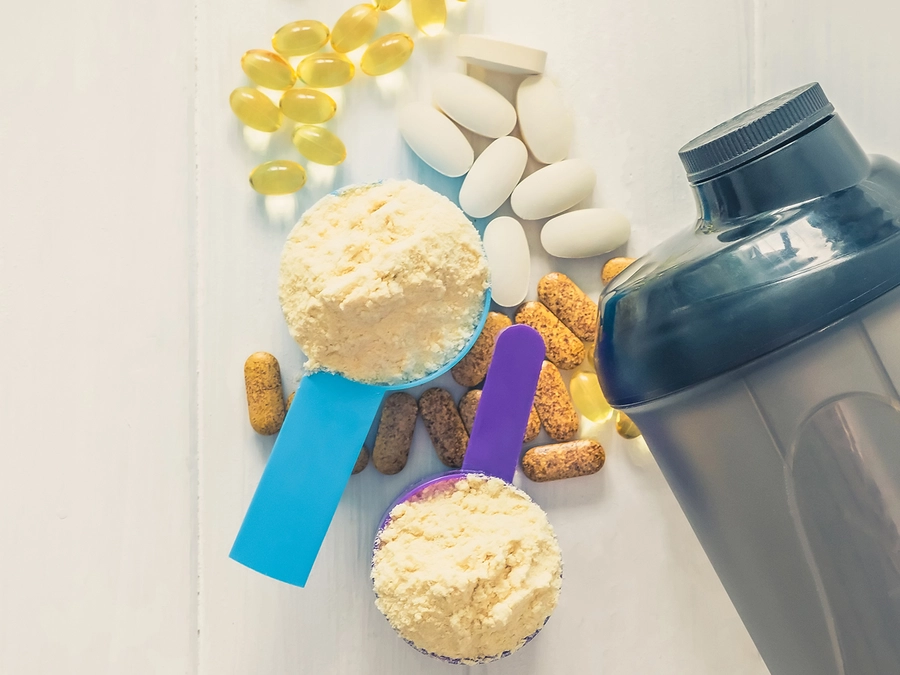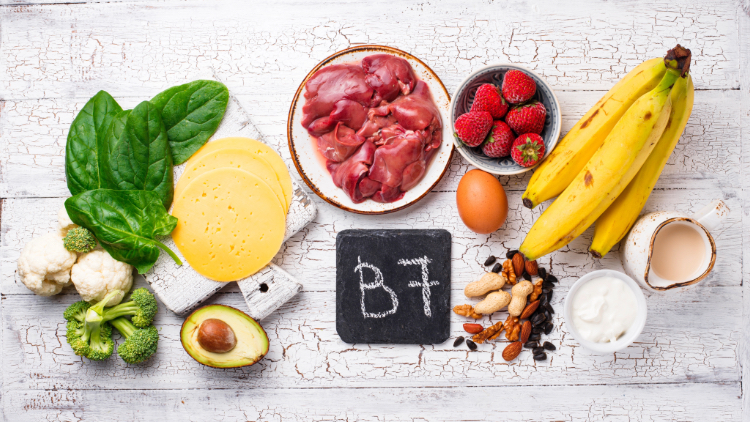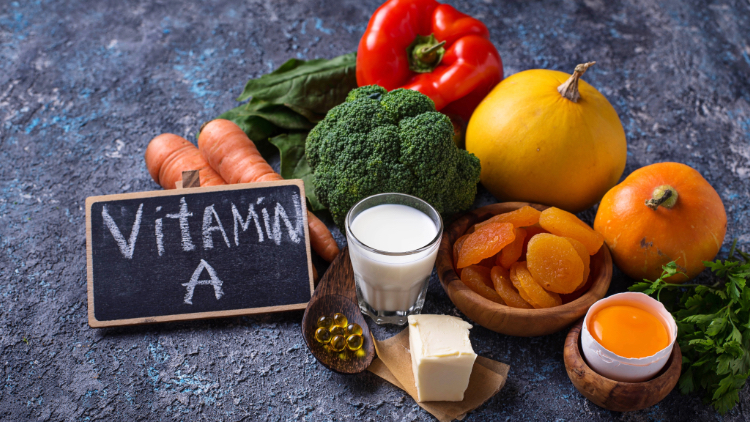
Many of us find it very challenging to meet our physical needs. This means that sometimes our body is deprived of important nutrients that we don't even know of. The vitamins play a very crucial role in the development of the body. This is why you must make sure that your body is getting enough of all the vitamins. From supporting immune function to boosting energy levels, vitamins are more than just supplementary additions to our diet; they are vital for maintaining optimal body performance.
In this article, we'll explore the top five vitamins you're probably not getting enough of. Discover the symptoms of deficiency, natural food sources, and practical tips to incorporate these essential nutrients into your daily routine.

In today's fast-paced world, maintaining a balanced diet can be a daunting task. With the increase in the usage of processed food, it can become quite hard for people to ensure they have a healthy diet. This is where the issue comes, and people deprive their bodies of essential nutrients. This is also the reason why people have vitamin and mineral deficiencies. The modern diet often lacks the variety and nutrient density of traditional diets.
The agricultural practices have also become rather bad over time. Usage of pesticides and chemicals has also decreased the quality of the food. As a result of this, the body does not get proper nutrients, which causes vitamin deficiencies.
Other factors can also affect the body. Habits such as smoking, alcohol consumption, and even chronic stress can lead to the body's vitamin depletion.
Vitamin D, often referred to as the "sunshine vitamin," is crucial for a variety of bodily functions, yet it's one of the most common deficiencies worldwide. This fat-soluble vitamin is unique because our bodies can produce it when exposed to sunlight. However, modern lifestyles often limit our time outdoors, and factors like sunscreen use and living in higher latitudes can further reduce our ability to synthesize vitamin D.
A deficiency in vitamin D can lead to a host of health problems. It plays a vital role in calcium absorption and bone health, meaning that insufficient levels can result in weakened bones and conditions like osteoporosis and rickets. Beyond bone health, vitamin D is also important for immune function, muscle health, and mood regulation. Symptoms of deficiency can include fatigue, bone pain, muscle weakness, and frequent infections.
To boost your vitamin D levels, try to spend more time outdoors in natural sunlight, especially during midday when UVB rays are most effective for vitamin D synthesis. Additionally, incorporate vitamin D-rich foods into your diet, such as fatty fish (like salmon and mackerel), fortified dairy products, egg yolks, and mushrooms exposed to sunlight. For those who have difficulty getting enough vitamin D through sunlight and diet alone, supplements can be an effective way to ensure adequate intake.

Cobalamin, another name for vitamin B12, is necessary for the synthesis of red blood cells, energy production, and brain function. Vitamin B12 insufficiency is surprisingly widespread, especially among some populations, despite its importance. Since animal products are the main source of this water-soluble vitamin, vegetarians and vegans are more likely to be deficient. Furthermore, as we age, our body's capacity to absorb vitamin B12 declines, potentially resulting in deficits in older adults.
Vitamin B12 insufficiency can cause a wide range of symptoms, many of which are initially mild. Fatigue, weakness, constipation, appetite loss, and weight loss are a few of them. Severe symptoms may impact the neural system, resulting in sadness, disorientation, tingling, and numbness in the hands and feet, balance issues, and even memory loss. Due to the variety of symptoms, vitamin B12 insufficiency may occasionally go unnoticed or be misdiagnosed.
Consume a lot of animal-based foods, such as meat, fish, poultry, eggs, and dairy products, to guarantee that you are getting enough vitamin B12. Fortified foods, such as plant milks and breakfast cereals, can supply some B12 for people on a plant-based diet, although supplements are frequently required to meet daily requirements. This common nutritional gap can be prevented and addressed by regular monitoring of vitamin B12 levels, particularly for those who are more likely to be at risk of deficiency.
Vitamin K2 is a lesser-known but incredibly important nutrient that plays a critical role in bone and cardiovascular health. While vitamin K1, found in leafy green vegetables, is well-known for its role in blood clotting, vitamin K2 is essential for directing calcium to the bones and teeth, where it is needed, and away from the arteries and soft tissues, where it can cause harm. This makes vitamin K2 crucial for preventing osteoporosis and arterial calcification, a risk factor for cardiovascular disease.
Many people are unaware of vitamin K2 and its importance, leading to widespread deficiencies. Unlike vitamin K1, which is readily available in many plant foods, vitamin K2 is found in fewer dietary sources, primarily animal products and fermented foods.
Symptoms of deficiency can be subtle and often go unnoticed, but over time, inadequate vitamin K2 can contribute to bone fragility and increased cardiovascular risk.
To boost your intake of vitamin K2, incorporate foods like natto (a fermented soybean product), cheese, egg yolks, and meat from grass-fed animals into your diet. Fermented foods such as sauerkraut and kimchi can also be good sources. For those who struggle to get enough vitamin K2 from food, supplements are available and can be particularly beneficial for bone and heart health. Awareness and proactive dietary choices can help ensure you receive enough of this vital nutrient.

As a fat-soluble vitamin, vitamin A is essential for the immune system, skin, and visual health. There are two main types of it: provitamin A carotenoids, such as beta-carotene, which are found in plant diets, and preformed vitamin A (retinol), which is found in animal products. Vitamin A deficiency is more prevalent than most people think, despite its significance, especially in underdeveloped nations where nutritional diversity may be scarce.
Vitamin A deficiency symptoms may impact numerous areas of health. Night blindness and dry eyes are early indicators that, if left untreated, can develop into more serious eye disorders and possibly blindness. Vitamin A is also essential for the preservation of healthy mucous membranes and skin, which serve as infection-resistant barriers. Dry, rough skin and heightened vulnerability to infections might result from a deficit.
Include both plant and animal sources of vitamin A in your diet to guarantee that you are getting enough of it. Fish, dairy products, and liver are foods high in retinol. Choose vibrant fruits and vegetables like kale, sweet potatoes, spinach, and carrots for provitamin A carotenoids. Vitamin A deficiency can be avoided, and general health can be supported with a balanced diet that contains a range of these items. Under a doctor's supervision, supplements may be considered in situations where dietary intake may be inadequate.
Vitamin E is a powerful antioxidant that plays a crucial role in protecting cells from oxidative damage, supporting immune function, and promoting skin health. Despite its importance, vitamin E is often overlooked, and many people do not get enough from their diet. This fat-soluble vitamin is found in a variety of foods, but factors such as poor dietary choices and certain health conditions can lead to deficiencies.
Symptoms of vitamin E deficiency can be subtle and may develop over time. They can include muscle weakness, impaired vision, and immune dysfunction. In severe cases, long-term deficiency can lead to neurological problems due to oxidative damage to nerve cells. Given its role in protecting cells from damage, adequate vitamin E intake is essential for maintaining overall health and preventing chronic diseases.
To increase your vitamin E intake, focus on consuming foods rich in this nutrient. Good sources include nuts and seeds (such as almonds and sunflower seeds), vegetable oils (like sunflower and safflower oil), and green leafy vegetables (such as spinach and broccoli). Additionally, fortified cereals and supplements can help ensure adequate intake, especially for those who may have difficulty getting enough vitamin E from food alone. A diet that includes a variety of these foods can help protect your cells and support overall health.

Recognizing a vitamin deficiency can be challenging, as symptoms often develop gradually and can be easily attributed to other causes. However, paying attention to your body and being aware of common signs can help you identify potential deficiencies. For instance, persistent fatigue, frequent infections, and slow wound healing may indicate a lack of certain vitamins. Additionally, changes in skin, hair, and nails, such as dryness, brittleness, or unusual pigmentation, can also be signs of nutrient deficiencies.
If you suspect you might be deficient in a particular vitamin, it's essential to consult with a healthcare professional. They can perform blood tests to measure your levels of specific vitamins and identify any deficiencies. Regular check-ups and monitoring are especially important for individuals at higher risk, such as older adults, those with certain medical conditions, and people following restrictive diets.
Apart from medical tests, keeping a detailed food diary can help you assess your dietary intake and identify any gaps. By tracking the foods you eat and comparing them to recommended daily intakes, you can get a clearer picture of whether you're meeting your nutritional needs. Awareness and proactive monitoring can help you address deficiencies before they lead to more significant health issues.
Diet, lifestyle, and specific medical conditions are some of the variables that can raise the risk of vitamin deficiencies. Poor dietary choices, such as eating a diet heavy in processed foods and low in fruits, vegetables, and whole grains, are among the most frequent causes. The diversity and nutrient richness required to achieve daily vitamin requirements are frequently absent from these diets.
Specific medical disorders and drugs may also hamper vitamin absorption and utilization. For instance, nutritional absorption may be hindered by gastrointestinal conditions such as Crohn's disease, celiac disease, and irritable bowel syndrome. Drugs, including metformin, proton pump inhibitors, and some anticonvulsants, can also impact vitamin levels.
Lifestyle choices, including smoking, binge drinking, and long-term stress, can further deplete the body's vitamin stores. Another important consideration is age, since as people age, their bodies' capacity to absorb and utilize vitamins declines. You can take preventative action to make sure you are getting the vitamins you require for optimum health by being aware of these risk factors.

When it comes to meeting your vitamin needs, obtaining nutrients from food is generally considered the best approach. Whole foods provide a complex array of vitamins, minerals, and other beneficial compounds that work synergistically to support health. Additionally, foods rich in vitamins often contain fiber, antioxidants, and other nutrients that supplements may lack.
However, there are situations where supplements can be beneficial or even necessary. For individuals with specific dietary restrictions, health conditions, or increased nutritional needs, supplements can help fill the gaps. For example, pregnant women, older adults, and people with certain medical conditions may require higher vitamin intakes that are difficult to achieve through diet alone. In such cases, supplements can provide a convenient and effective way to ensure adequate intake.
It's important to approach supplementation with caution and under the guidance of a healthcare professional. Excessive intake of certain vitamins, particularly fat-soluble ones like vitamins A, D, E, and K, can lead to toxicity and adverse health effects. A balanced diet, coupled with targeted supplementation when needed, can help you achieve optimal vitamin levels and support overall health.
You must get high-quality supplements to overcome the deficiencies in your body. But the question is, where to get them from. There are many online platforms; however, one of the most reliable ones is Revolution Nutrition. We have clean and high-quality ingredients in our supplements. This means that it is safe to be used in your body and won't cause any harm. Therefore, make sure to check out our page and see all our amazing products.
Ensuring you get enough of the essential vitamins your body needs doesn't have to be overwhelming. By making small, intentional changes to your diet and lifestyle, you can significantly improve your vitamin intake and overall health. Start by incorporating a variety of nutrient-dense foods into your meals, focusing on colorful fruits and vegetables, lean proteins, whole grains, and healthy fats.